The Truth about Nutrition Science with Dr. Gil Carvalho MD

Dr. Carvalho discusses the prevalence of misinformation in nutrition science and the importance of considering scientific evidence and methodology. He emphasizes the importance of examining the pattern of research over time, rather than relying on individual studies, and warns against oversimplifying complex scientific concepts. Dr. Carvalho also touches on the challenges of communicating nuanced information to the public and the rise of evidence-based content from scientists and doctors on social media. He discusses the complexity of nutrition science, focusing on the health effects of different foods, specifically milk, and the controversies surrounding certain food groups like dairy and saturated fat. Dr. Carvalho encourages a balanced approach to nutrition and warns against labeling certain foods as universally good or bad based on individual sensitivities or intolerances. He also discusses the importance of considering multiple studies and perspectives in nutrition science and the need to base scientific claims on evidence rather than personal biases or ideologies.
Beyond Veganism with Zoe Rosenberg & Chris Jeffries (Animal Rights Activism)

Zoe Rosenberg, an American animal rights activist and founder of the Happy Hen Animal Sanctuary, shares her experiences of protesting against animal cruelty and being charged for animal rescues. Growing up with a deep love for animals, Rosenberg became a direct action animal rights activist, organizing protests and rescues. She recounts her involvement with Direct Action Everywhere (DXE) and the arrests and convictions of its co-founder, Wayne, for animal rescues. Rosenberg also shares her personal experiences with being charged for rescuing dogs and facing harsh punishments, emphasizing her commitment to animal rights despite the challenges. The speakers express their frustration with the legal system’s treatment of animal cruelty cases and encourage viewers to get involved in animal activism beyond veganism, including attending protests and visiting animal sanctuaries. They also discuss the intelligence and worth of farmed animals and encourage viewers to support individuals legally pursued for rescuing animals. Its time to save animals beyond veganism!
When Will Humans Go Extinct | Professor Guy McPherson Ph.D. | HR #211
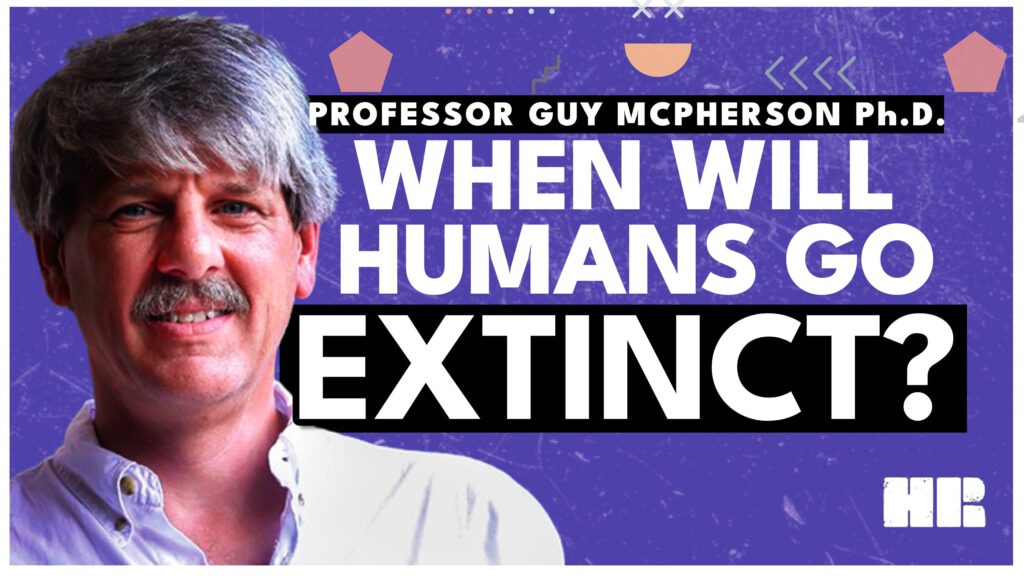
Professor Guy McPherson discusses various topics related to the ongoing mass extinction event, denialism, and the limitations of human progress. He mentions the denial of the mass extinction event by many people, including government officials and media personalities, and shares his personal experience with a defamation campaign. McPherson also touches on the issue of microplastics and their impact on wildlife and humans. Furthermore, McPherson discusses the concept of progress and the limitations of man-made advancements, using the example of civilization functioning as a heat engine. He shares anecdotes from his high school days and draws parallels between cultural differences in Europe and America. McPherson also shares his perspective on historical events, such as World War I, World War II, and the Spanish Flu, and their impact on population growth. Additionally, McPherson discusses the importance of skilled labor and the role of white privilege in global overpopulation. He shares his personal struggles with physical and mental health and reflects on how society has changed regarding health and the naming of clothing. McPherson also discusses the historical exclusion of women in scientific fields and the case of Paul Ehrlich’s “The Population Bomb” publication. Throughout the conversation, McPherson expresses frustration over humanity’s denial of the potential negative consequences of civilization and the importance of taking care of oneself and others
A Conversation with Sea Shepherd Founder Captain Paul Watson | HR #210
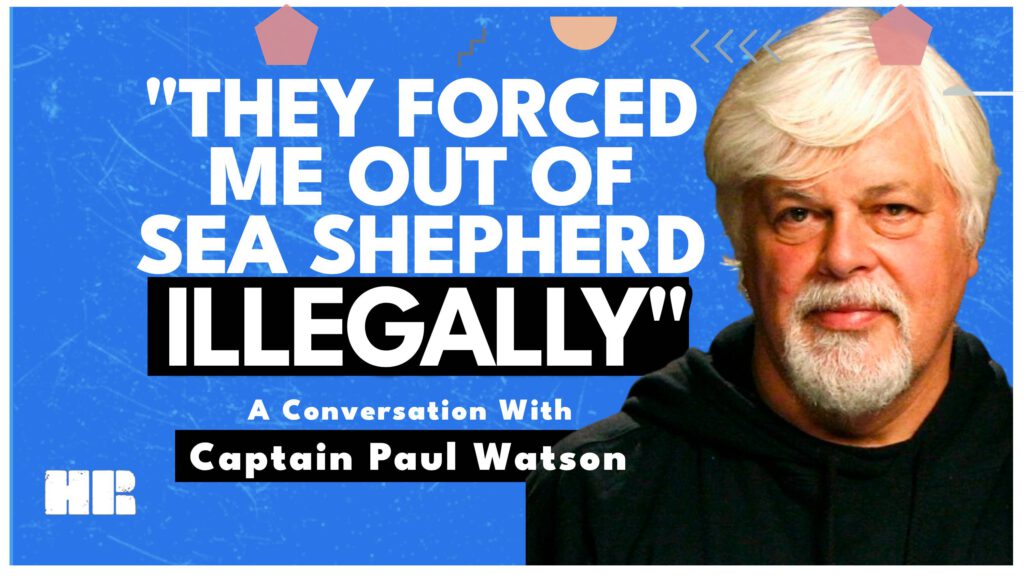
Captain Paul Watson, a Canadian American environmentalist, animal rights activist, marine wildlife conservationist, author, and founder of the Sea Shepherd Conservation Society, shares his lifelong dedication to protecting marine life and the natural world. Watson discusses his earliest memories of being fascinated by animals and his philosophy of aggressive nonviolence. He recounts his experiences with Greenpeace, which sparked his commitment to animal rights activism, and his decision to establish Sea Shepherd to directly intervene and save animals from harm. Watson also reflects on the challenges he faced with the bureaucratization and hijacking of Sea Shepherd, as well as his legal issues and international travel experiences. Throughout the conversation, Watson emphasizes the importance of taking action in the present and using one’s skills to make a difference in the world, while encouraging persistence in the face of adversity. He shares examples of individuals who have changed the world and encourages young people to follow their passions and take action, despite the difficulties and uncertainty of the future.
The Strength of Western Propaganda | Alan MacLeod & Chris Jeffries | HR #209
Alan Macleod and Chris Jeffries discuss the biased coverage of the Israeli-Palestinian conflict by Western media and the role of propaganda in shaping public perception. They critique the use of the term “war” to describe the conflict, arguing that it’s not between two equal sides but rather decades of occupation leading to the displacement of nearly two million Palestinians. They also criticize the media’s acceptance of Israeli claims without reporting on the other side and the blame placed on Palestinian groups. They provide examples of false information spread through social media accounts and discuss the economic power of China and its impact on Southeast Asian countries. They argue that the United States may try to maintain control through military means as it economically declines. They also discuss the similarities in foreign policy decisions between Republican and Democratic presidents and the focus on Russian interference in the 2016 election. They express concern over the weaponization of social media and the potential for dangerous wars, such as the one being pushed by the influential group United Against Nuclear Iran (UANI), which aims for regime change in Iran.
America Is STUCK in the 20th Century | Ben Norton | HR #208
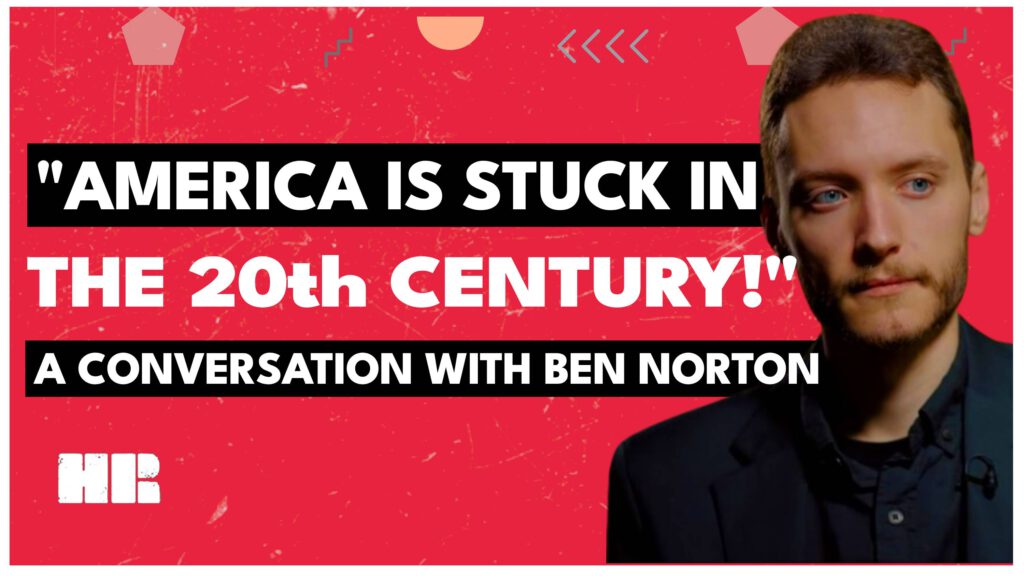
Ben Norton from The Geopolitical Economy Report, discusses various issues and global power shifts are discussed, with a focus on the International Court of Justice (ICJ), Israel, and the Middle East. Ben Norton highlights Israel’s history with the ICJ, including its losses in cases related to the separation wall and actions against Nicaragua during the Reagan Administration. The US’s veto power in the Security Council has prevented the implementation of these rulings, raising questions about the outcome of the current allegations of genocide against Israel at the ICJ. Additionally, Ben Norton discusses the US’s influence in the Middle East and China’s rise as a manufacturing superpower and a significant player in the production of green technology. The US’s interventionist policies and historical support for extremist Islamist groups in the region have fueled ongoing conflicts, causing many countries to seek closer ties with China. This trend is further augmented by China’s economic cooperation with various countries, including those in Africa, where the US has experienced negative impacts due to its historically aggressive foreign policies. Ben Norton also touches upon the resource curse, the influence of former colonizers in West African countries, and Russia’s diplomatic and trade strategies in Africa and South Asia. The US’s historic interventions and the limited incentives it offers have driven many developing countries to seek economic and diplomatic cooperation with China. The speaker argues that the US, stuck in a 20th-century mindset, needs to provide more incentives to compete with China rather than just threats.
Anti Zionism is NOT Anti-Semitism | Qorantos & Chris Jeffries | HR #207

Qorantos and Chris Jeffries discuss the Israeli-Palestinian conflict’s complexities and the controversial association between anti-Zionism and anti-Semitism. Guest Corantos, known for his debates regarding Gaza and Israel-Palestine, shares his views on Israel’s actions, questioning the use of the “human shield” argument and challenging the assumption that Zionists genuinely desire coexistence. The speakers also discuss the larger implications of US alliances with Israel, political discourse, and ethical concerns. In a lighter segment of the conversation, they touch on technological advancements, mental health, and the ethical considerations of veganism and animal agriculture.
Gaza, Capitalism and Imperialism | A Conversation with RATHBONE | HR #206

Rathbone discusses the complexities of capitalist systems, using the examples of New Orleans’ corrupt politics and the Israeli-Palestinian conflict. He shares his perspective on the struggling city of New Orleans, attributing its corruption to capitalist systems and admitting his deep connection to the city despite its challenges. However, he also emphasizes its unique history and cultural contributions. Regarding the Israeli-Palestinian conflict, Rathbone and Chris Jeffries discuss the historical context, including the displacement of Palestinians and the use of violence. They argue that Palestinians, like the Houthis in Yemen, resist by disrupting trade and challenging power imbalances. Rathbone is critical of international involvement, particularly the role of the United States, and expresses sympathy for resistance groups. The conversation also delves into the complexities of morality and violence in the context of the conflict. Rathbone argues against the condemnation of Palestinians for using violent resistance, noting historical examples of justified violence against oppressors. They also critique undercover Israeli operatives’ use of deception, emphasizing its harmful impact on the Palestinian community. Furthermore, Rathbone explores the control of resources and exertion of power through the examples of the Israeli-Palestinian conflict and U.S.-Israeli relationship. He calls for recognition of historical decisions and their consequences and warns of the potential global consequences if such actions continue.
Re-Engineering Humanity | Brett Frischmann | #205 HR Podcast
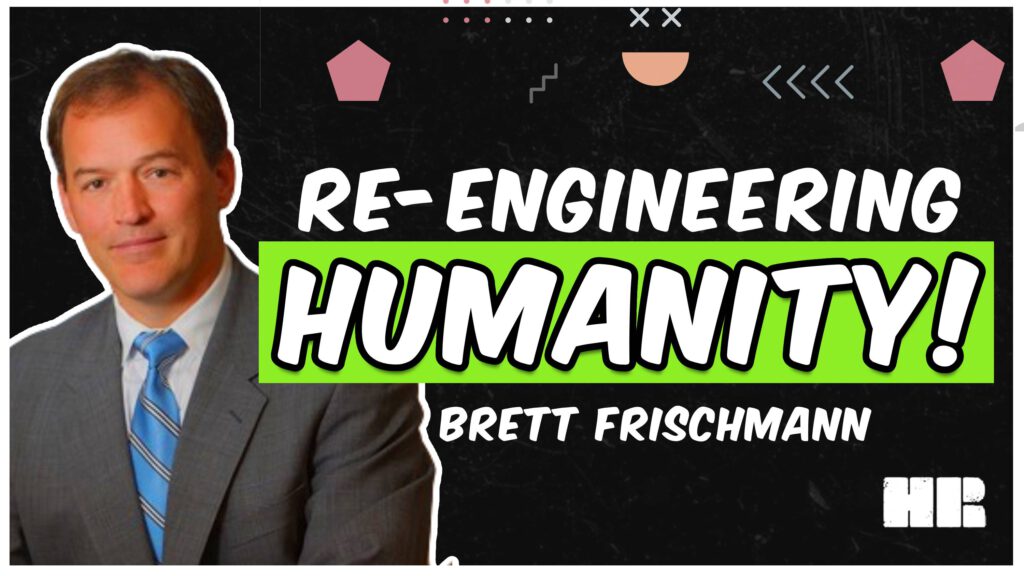
Brett Frischmann, the interdisciplinary law professor shares his unexpected journey from studying math, science, and astrophysics to becoming a law professor specializing in technology and economics. Frischmann discusses his book, “Re-Engineering Humanity,” which explores the impact of technologies and infrastructures on individuals and communities. He also expresses concerns about the power dynamics and potential consequences of surveillance and data collection, particularly within the context of the internet and artificial intelligence. Throughout the discussion, Frischmann emphasizes the importance of understanding the complex and interconnected nature of societal issues, including the role of individuals and communities in engaging with technology. He also touches upon the potential dangers of propaganda and manipulation, particularly in the context of new communication and media technologies. Overall, Frischmann’s talk highlights the importance of questioning our desires, understanding the systems that shape our beliefs, and advocating for responsible use of technology.
Why is Regulation Slower Than Technology? | Bruce Schneier | #204 HR Podcast
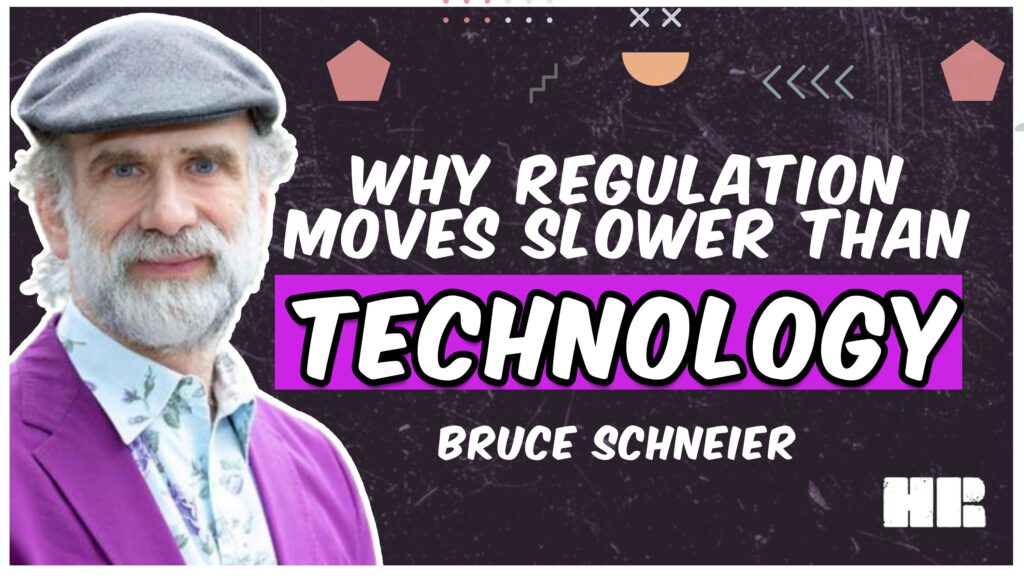
Cybersecurity expert Bruce Schneier discusses the challenges of applying traditional systems like democracy and capitalism to the information age. He argues that these outdated systems are struggling to adapt to the complexities of modern technology, leading to power imbalances and issues like slow regulation. Schneier expresses a desire to find new solutions and a greater role for regulatory bodies in counterbalancing corporate power. He also discusses the challenges of securing democracy in the digital age, particularly in relation to social media and fake news. Topics addressed include market dynamics, network effects, and the need for new ways to regulate companies and protect consumer rights in the face of rapidly evolving technologies, such as DRM and facial recognition. Concerns over privacy and data sharing with law enforcement are also highlighted